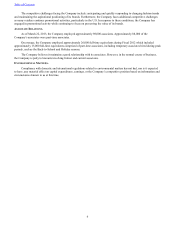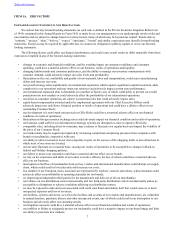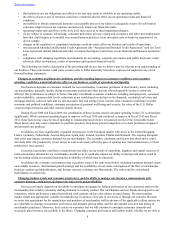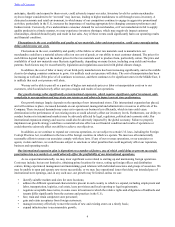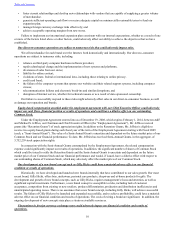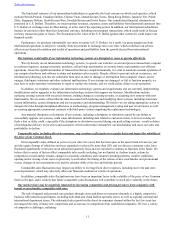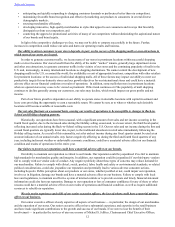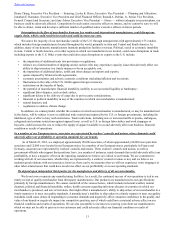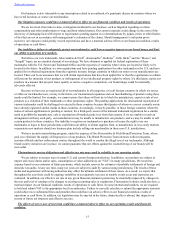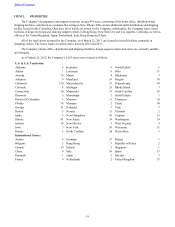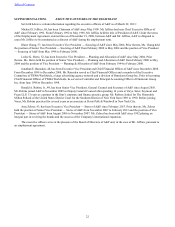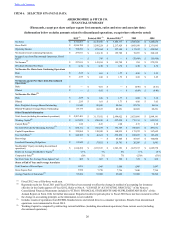Abercrombie & Fitch 2013 Annual Report Download - page 16
Download and view the complete annual report
Please find page 16 of the 2013 Abercrombie & Fitch annual report below. You can navigate through the pages in the report by either clicking on the pages listed below, or by using the keyword search tool below to find specific information within the annual report.
16
The continued threat of terrorism and the associated heightened security measures and military actions in response to acts
of terrorism have disrupted commerce. Any further acts of terrorism or a future war may disrupt commerce and undermine
consumer confidence, which could negatively impact our sales revenue by causing consumer spending and/or mall traffic to
decline. Furthermore, an act of terrorism or war, or the threat thereof, or any other unforeseen interruption of commerce, could
negatively impact our business by interfering with our ability to obtain merchandise from foreign manufacturers. Our inability
to obtain merchandise from our foreign manufacturers or substitute other manufacturers, at similar costs and in a timely
manner, could adversely affect our operating results and financial condition.
Our inability to obtain commercial insurance at acceptable prices or our failure to adequately reserve for self-insured
exposures might increase our expenses and adversely impact our financial results.
We believe that commercial insurance coverage is prudent for risk management in certain areas of our business.
Insurance costs may increase substantially in the future and may be affected by natural catastrophes, fear of terrorism, financial
irregularities and other fraud at publicly-held companies, intervention by the government or a decrease in the number of
insurance carriers. In addition, the carriers with which we hold our policies may go out of business, or may be otherwise unable
to fulfill their contractual obligations. Furthermore, for certain types or levels of risk, such as risks associated with earthquakes,
hurricanes or terrorist attacks, we may determine that we cannot obtain commercial insurance at acceptable prices, if at all.
Therefore, we may choose to forego or limit our purchase of relevant commercial insurance, choosing instead to self-insure one
or more types or levels of risk. We are primarily self-insured for workers’ compensation and associate health benefits. If we
suffer a substantial loss that is not covered by commercial insurance or our self-insurance reserves, the loss and attendant
expenses could harm our business and operating results. In addition, exposures could exist for which no insurance may be
available and for which we have not reserved.
Operating results and cash flows at the store level may cause us to incur impairment charges.
Long-lived assets, primarily property and equipment, are reviewed at the store level at least annually for impairment, or
whenever changes in circumstances indicate that a full recovery of net asset values through future cash flows is in question.
The review could result in significant charges related to underperforming stores which could impact our results of operations.
Furthermore, our impairment review requires us to make estimates and projections regarding, but not limited to, future
cash flows. We make certain estimates and projections in connection with impairment analyses for our store locations and other
property and equipment. If these estimates or projections change or prove incorrect, we may be, and have been, required to
record impairment charges on certain store locations and other property and equipment. We have recognized significant
impairment charges in the past and may do so in the future.
We are subject to customs, advertising, consumer protection, privacy, zoning and occupancy and labor and employment
laws that could require us to modify our current business practices, incur increased costs or harm our reputation if we do
not comply.
We are subject to numerous laws and regulations, including customs, truth-in-advertising, consumer protection, general
privacy, health information privacy, identity theft, online privacy, unsolicited commercial communication and zoning and
occupancy laws and ordinances that regulate retailers generally and/or govern the importation, promotion and sale of
merchandise and the operation of retail stores, direct-to-consumer operations and distribution centers. As our business becomes
more international in scope and we enter more countries internationally, the number of laws and regulations that we are subject
to, as well as their scope and reach, increase significantly and heighten our risks. If these laws and regulations were to change,
or were violated by our management, associates, suppliers, vendors or other parties with whom we do business, the costs of
certain merchandise could increase, or we could experience delays in shipments of our merchandise, be subject to fines or
penalties, or suffer reputational harm, which could reduce demand for our merchandise and adversely affect our business and
results of operations. Failure to protect personally identifiable information of our customers or associates could subject us to
considerable reputational harm, as well as significant fines, penalties and sanctions both domestically and abroad. In addition,
changes in federal, state and international minimum wage laws and other laws relating to associate benefits could cause us to
incur additional wage and benefits costs, which could hurt our profitability. We are also subject to U.S. securities laws and
regulations, as well as stock exchange rules which could subject us to enforcement actions, de-listing and adverse legal
sanctions for non-compliance.
Changes in the regulatory or compliance landscape could adversely affect our business and results of operations.
Laws and regulations at the state, federal and international levels frequently change, and the ultimate cost of compliance
cannot be precisely estimated. In addition, we cannot predict the impact that may result from changes in the regulatory
landscape. Any changes in regulations, the imposition of additional regulations, or the enactment of any new or more stringent
legislation including those related to health care, taxes, transportation and logistics, privacy, environmental issues, trade,
product safety or employment and labor, could adversely affect our business and results of operations.
Table of Contents


